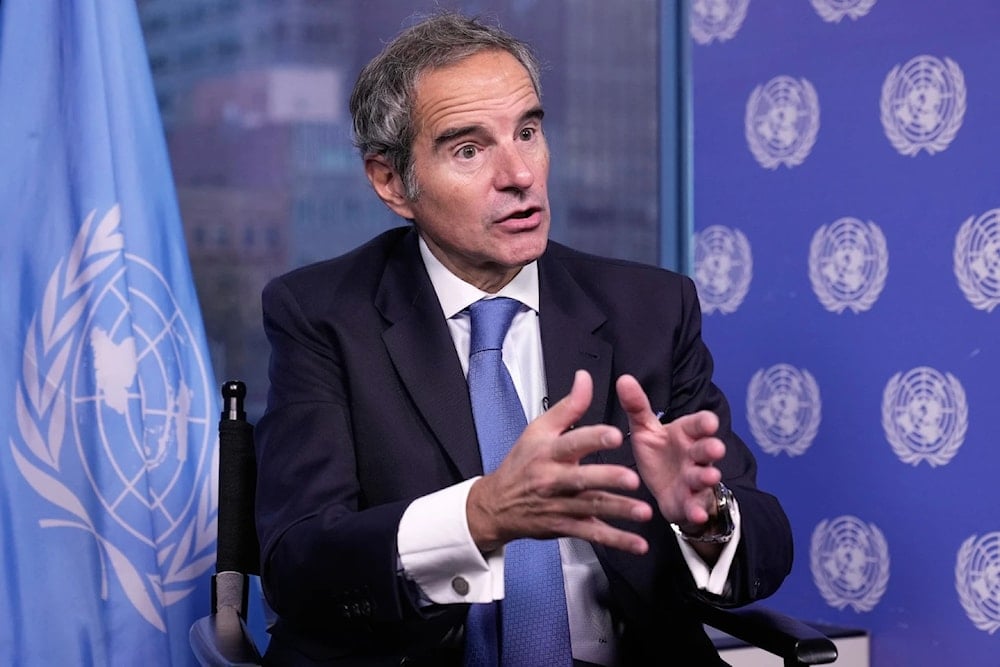Iran not enriching uranium, movement detected near stockpile: Grossi
The head of the UN nuclear watchdog says Iran has shown renewed movement at nuclear sites, admitting that uranium enrichment has not accelerated since the Israeli war on Iran.
-

International Atomic Energy Agency Director General Rafael Grossi is interviewed at United Nations headquarters, Wednesday, Oct., 29, 2025 (AP)
While Iran does not appear to be actively enriching uranium, renewed movement has recently been detected at the country’s nuclear sites, the head of the UN nuclear watchdog, Rafael Grossi, told The Associated Press on Wednesday.
IAEA Director General Rafael Grossi stated that while inspectors have been unable to fully access the sites, they have not seen any satellite activity to indicate that the Islamic Republic has accelerated its production of uranium enriched beyond the levels compiled before the 12-day war with "Israel" in June.
Grossi told AP that the nuclear material enriched at 60% is still in Iran, which is one of the points under discussion because inspectors need to return to confirm the material is there and not being diverted to any other use.
“This is very, very important," he added.
Grossi, however, said that inspectors have seen movement around the sites where the stockpiles are stored and explained that, without additional access, the UN has had to rely on satellite imagery, which can only show so much.
The joint Israeli-US war on Iran set back the IAEA's years of progress with Tehran, especially since the war was waged on Iran as the agency was about to be given access to a third enrichment site; however, Grossi stated that as of Wednesday, there is no active operation at the location in Isfahan.
How the IAEA was politicized in the Israeli war on Iran
In the period preceding the Israeli war on Iran in June 2024, the International Atomic Energy Agency (IAEA) released a report expressing concern over Iran’s growing stockpile of enriched uranium and limited cooperation with international inspectors.
The report confirmed that Iran had amassed significant quantities of uranium enriched up to 60%, a level considered technically close to weapons-grade. However, it also noted that there was no evidence to suggest the material had been diverted for non-peaceful purposes, and Iran itself affirmed time and again that it does not intend to possess a nuclear weapon, asserting that its stockpiles are meant solely for civilian use.
Iran slams IAEA report as 'politically motivated'
Iran denounced the IAEA report as “unfair and politically motivated”, with Foreign Ministry spokesperson Esmaeil Baghaei calling it a “rehash of past issues” used to justify Western pressure. Tehran accused the agency of bias and of relying on “forged Israeli documents,” while ignoring “Israel’s undeclared nuclear arsenal.”
The Atomic Energy Organization of Iran affirmed that the country has met all safeguards obligations and warned that any hostile resolution would prompt “decisive responses”, including accelerating enrichment.
Despite these assurances and with the support of the United States, "Israel" initiated a war against the Islamic Republic, an action that drew no condemnation from the International Atomic Energy Agency, even after three Iranian nuclear facilities were bombed with American-made bunker-buster bombs, subsequently prompting Iran to suspend its cooperation with the agency.
Snapback collapses Cairo agreement
Following the war, Iran and the IAEA signed an agreement in Cairo to resume cooperation and restart inspections, in a manner that safeguards Iran's rights and sovereignty and contingent upon the authorization of Iran's Supreme National Security Council.
At the time, Iranian Foreign Minister Abbas Araghchi warned that in the event of military aggression or the re-imposition of sanctions, "any agreement would be considered null and void."
That is why the agreement was quickly derailed after the E3 decided to activate the snapback mechanism and reinstate sanctions on Iran previously suspended under the JCPOA agreement, prompting Iran to reduce its cooperation with the IAEA.

 4 Min Read
4 Min Read










